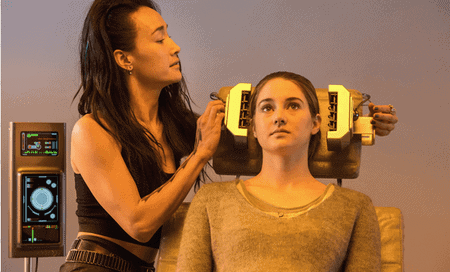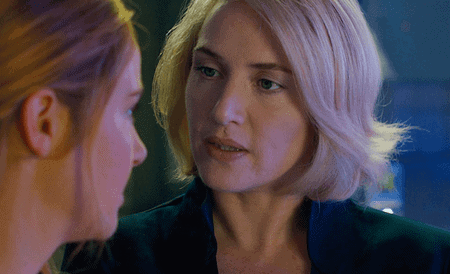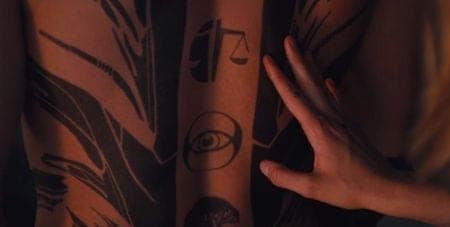The trouble begins when Tris takes her aptitude test which is essentially a series of drug-fueled hallucinations. Her results are inconclusive. She is "Divergent" (uh oh) scoring in Dauntless (the warrior faction), Candor (the honest tribe who we spend no time with. In the sequels perhaps?) and her original tribe Abnegation. The test is administered by Plot Convenient Expositionist (not her real name) played by Maggie Q. She's Dauntless's tattoo artist but also works in this government capacity for reasons of because. She's everywhere! She warns Beatrice that she must tell no one of the test results for her own safety. Divergents are being hunted because they threaten the status quo.
I'd like to say "then all hell breaks loose" but because this is the first in a trilogy (or quadrilogy if it's successful?) these stories are always padded. I'm still trying to work out why we spend any time with Beatrice's brother, for example, who seems to have no bearing whatsoever on the plot that isn't amply covered in other ways. Beatrice makes her Faction Choice, an event which is played for as much suspense as it can muster, an impressive amount actually, considering all the foreshadowing about where her heart truly lies. It lacks the gut punch of The Reaping, the similar kick-off plot point in Hunger Games, that beloved YA franchise to which Divergent, must do battle in the public imagination. But I vastly preferred it to the similar much stupider "Sorting Hat" sequence in Harry Potter where all the bad guys go to Slytherin and all the heroes go to Gryffindor and all the extras go to the other places.
Divergent, unlike that earlier phenomenon, understands that nobody is just one thing. That's the whole point of it really. Aren't we all divergent? The best hope for Divergent as a franchise is that it continues to play up these shades of gray and the multi-faceted aspects of human nature. Though we only spend time with three factions (Dauntless, Erudite, and Abnegation) each are revealed to have both good and bad people among them and, more impressively, characters that might tilt back and forth with the wind. But, since Hollywood's anti-intellectualism never rests, you already know that Erudite (the "intelligent" faction) is where we will find our master villain. She's embodied by Kate Winslet, giving icy blond bureaucrat realness. We are cued to distrust her from her first appearance. Winslet is fine if nothing more in basically the same role that Jodie Foster butchered in Elysium.
The bulk of the movie's two hours and twenty minutes is Tris's training in her faction. This training also involves drug-fueled hallucinations wherein she must face her greatest fear, which appears to be birds so she's been watching too much Hitchcock. All these virtual scenes, wherein the heroine vocalizes "this is not real", lend the movie a curious weightlessness — if it's not real for her can it ever be real for us?. But here, too, a dichotomy. Despite that weightlessness and the disadvantage of a far less instantly primal and bloody premise, Divergent actually does a better job than The Hunger Games of making its deaths (and potential deaths) real both for the audience and for the heroine. It's far more believable in this one way than Katniss's eternal innocence in her gladiator games.
Despite strong moments sprinkled about, we're killing time. We wait for our heroine to break her silence and make a move and, thus, a movie. Divergent "The Pilot" finds its spiritual twin in its own "sex" scene. Beatrice finally admits her feelings for her mysteriously named trainer "Four" after he removes his shirt — Theo James' body will do that to you. Four shows her his tattoo of the five factions so he's doing a very bad job of hiding his own Divergency since this tribe has communal bathrooms and bedrooms. Beatrice and Four begin passionately kissing, but just as things are heating up, she puts on the breaks.
"I don't want to move too fast," she whispers softly but firmly. You can practically hear the screenwriter, director and executive producers mouthing it along with her. There's more money to be made if your franchise moves at a snail's pace. 'Hey, let's split the final book in half!'
* All Utopias in science fiction are actually Dystopias in disguise. And Dystopias are also actually Dystopias so basically there's no hope for the human race. Cheers!
Nathaniel Rogers would live in the movie theater but for the poor internet reception. He blogs daily at the Film Experience. Follow him on Twitter @nathanielr.






